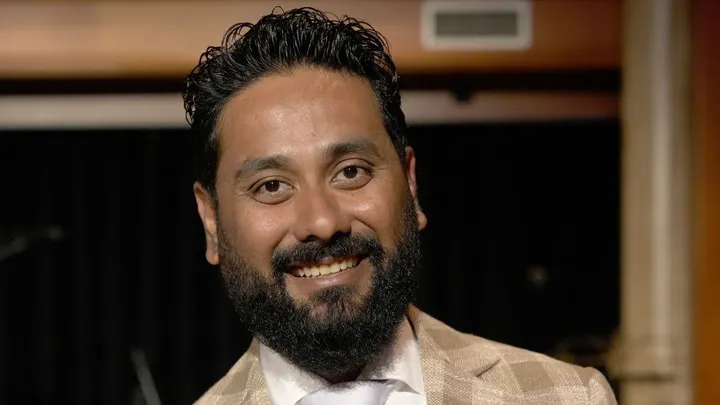
When my friend, Sabyasachi (Saby) Sengupta stepped off stage as the 2025 Toastmasters World Champion of Public Speaking in Philadelphia, I couldn’t have been happier. But I also realized something: our two-month coaching journey had taught me as much as it taught him.
Through our written exchanges and live sessions together, I was reminded of some essential lessons about the coach–speaker relationship.
These lessons apply not only to world championship speeches, but to any situation where one person helps another prepare to speak.
Setting the Foundation
1. Don’t overwhelm
When I offered to help Saby, I sent him a text message that contained the following: “You will undoubtedly be inundated with offers from people to help you. I am happy to help in any way I can, but you need to avoid being overwhelmed with too much advice. So, no worries if you feel you already have enough support. You need to pace yourself. Best of luck whatever you decide.”
Speakers at this level are bombarded with feedback. Too much input can paralyze rather than help. Coaching starts with humility. You are there to serve, not to take over.
Takeaway: Offer help without adding pressure.
2. Start with their needs
The first question I asked was not, “Here’s what I think you should change.” It was, “What are you looking for from me?”
That one question framed the entire relationship. It made sure we were aligned from the beginning. Coaching is not about your ego or your agenda; it is about meeting the speaker where they are.
Takeaway: Begin by asking, not telling.
3. Focus on your unique value
I knew the areas where I could add the most value: speech structure, humour, rhetorical devices and phrasing. Those are my strengths.
Of course, we also touched on body language and voice and I did make suggestions, but those are areas where Saby is naturally stronger than me. So, I didn’t try to be the expert there. Instead, I complemented his abilities.
Takeaway: Focus on what you can do best.
Shaping the Speech
4. Know when to push, when to step back
There were times I made suggestions and Saby wasn’t comfortable with them. The suggestions weren’t wrong; they just weren’t for him. If the point wasn’t critical, I stepped back. You have to respect the speaker’s judgment.
But when I knew something would make a measurable difference—like a particular pause that would set up a laugh, or a particular way of wording a sentence—I pushed harder. We went over it until Saby felt it, and when it landed, he saw why it mattered.
Takeaway: Not every hill is worth dying on. Save your insistence for the moments that truly elevate the speech.
5. Respect the coaching village
Saby had another main coach, and he also received feedback from many people. At times, he must have been inundated with suggestions.
That required me to check my ego. I was one voice among many, not the voice. My role was to add value where I could, not to control the process.
Takeaway: Be a voice, not the voice.
Final Preparation
6. Lock the speech down
As the contest drew closer, my suggested changes became fewer and fewer. At some point, you have to stop tweaking and lock the speech down.
Endless revisions erode confidence. In those final days, my role was less about editing the speech and more about helping Saby be in the right frame of mind.
Takeaway: Stop revising; start rehearsing. Good coaching involves knowing when to switch from the former to the latter.
7. Value the “bad” rehearsals
Not every practice run went well. Sometimes Saby delivered a version that wasn’t very good.
But I always saw that as a positive. I told him, “Good! We’re getting the bad stuff out now!” Rehearsal is the place for mistakes. That’s how you sharpen a speech.
Takeaway: Sweat in practice so you don’t bleed in battle.
Overarching Principles
8. Give specific feedback
“Good job” or “That didn’t work” isn’t enough. Feedback only helps if it is precise.
So instead of saying, “Make it funnier,” I would point to a specific line and suggest a wordplay, a call-back, or a rhetorical twist. The more concrete the feedback, the faster the progress.
Takeaway: Give feedback that is clear, concrete and immediately actionable.
9. Provide emotional support
Preparing for the biggest stage in public speaking is not just technical; it is emotional. Doubts creep in. Nerves rise. Energy dips.
When we began our last coaching call (the day before the Final), the first thing I did was to have Saby close his eyes and we did the “box breathing” exercise to slow things down and get in the right headspace for the call.
One of the most important things a coach can do is provide perspective, calm, and encouragement. Sometimes, the right words are not about the speech, but about the speaker.
Takeaway: Coaching is as much about grounding the person as it is about refining the performance.
Conclusion
Coaching a speaker at this level is not about giving endless notes. It is about partnership, trust and clarity. It is about knowing when to speak, when to stay silent, and when to simply encourage.
Whether you are helping a colleague with their first presentation or working with a World Champion, these lessons apply.
In the end, the best coaches don’t put words in someone else’s mouth.
They create the conditions for the speaker’s own voice to shine.















